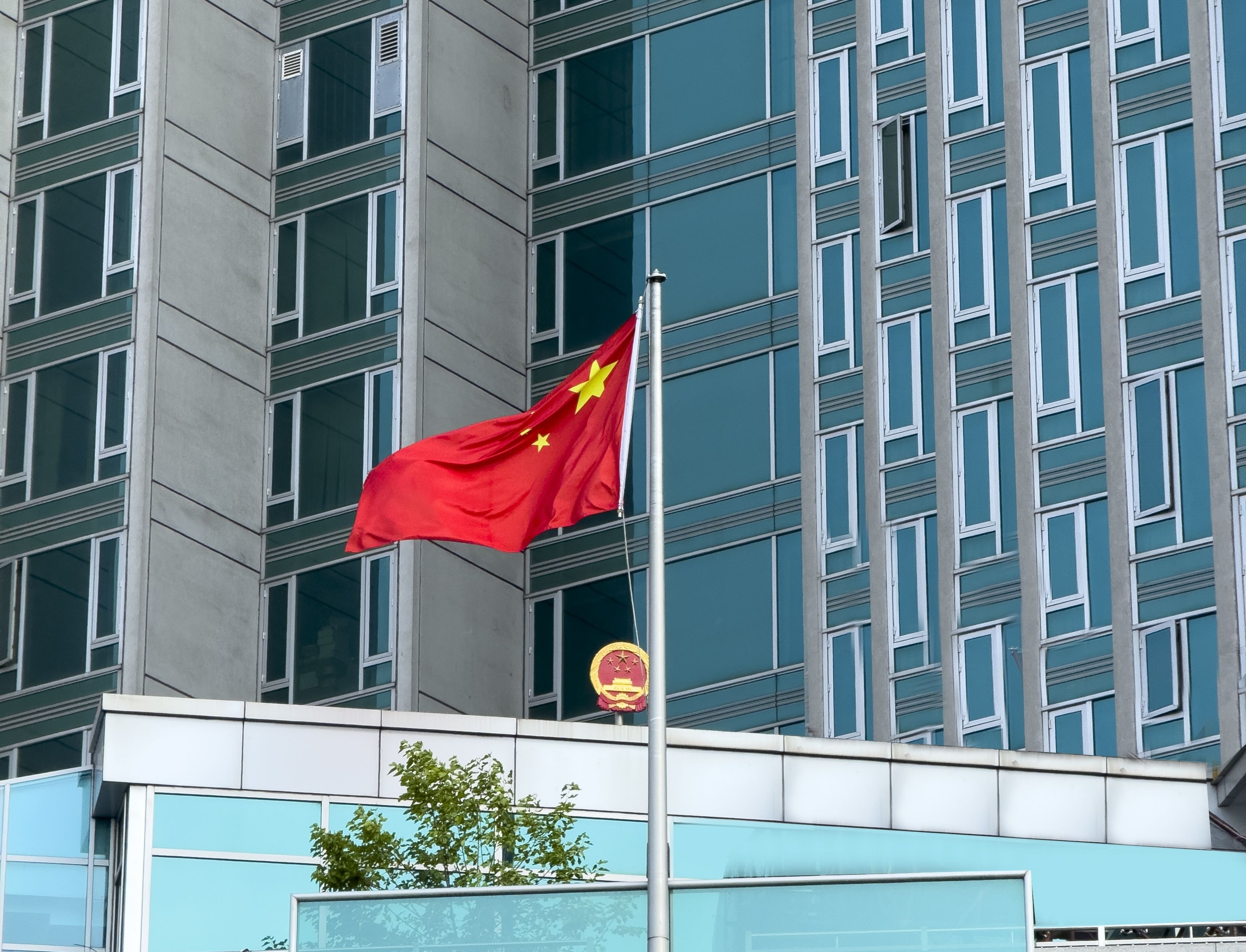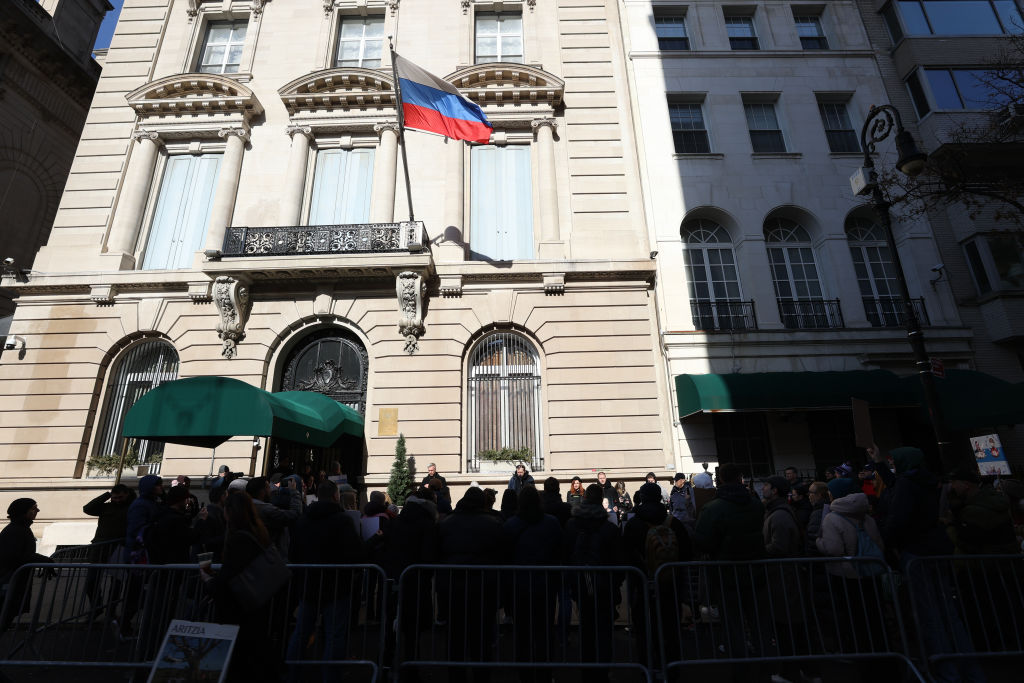Immigration
New York’s consulates bring in the world
Consuls provide passports and tourist visas, while blending advocacy and, oftentimes, gentle diplomacy to further a nation’s domestic and foreign interests.

Visitors enter the Colombian Consulate in Manhattan on January 27, 2025. KENA BETANCUR/AFP via Getty Images
On an upper floor of the historic John Henry Hammond House on New York City’s Upper East Side, a gilded ballroom sits darkly with its curtains drawn. Its cocktail tables draped in white fabric, the city’s glamorous Russian Consulate sees few dignitaries – a reflection of its strained diplomatic standing in the world.
In Midtown, amid the bustling consulates surrounding the United Nations, the Mexican Consulate is a flurry of action: deploying mobile “consulates on wheels” to meet new arrivals with documentation across New York state. A similar frenzy can be found at the Haitian Consulate, where consulate officers deal with a spike in passport demands as Temporary Protected Status holders anxiously prepare for federal immigration changes.
New York City’s consulates are on the front lines of international issues affecting its citizens – whether they be international, federal, state or local policies.
“New York City is a group of cultures, and they represent them. They’re like the mayor for that culture,” said New York City Council Member Gale Brewer, whose annual consulate receptions at the New York Public Library throughout her Manhattan borough president tenure have made her a popular contact within the diplomatic community.
While consulates deliver a predictable menu of services: passports, tourist visas, notaries and more – in the host city of the United Nations, the role of consul is not so easily defined, blending advocacy and, oftentimes, gentle diplomacy to further a nation’s domestic and foreign interests.
And that can range from the benign, see New York City Mayor Eric Adams’ frequent flag raisings, to actions that result in federal charges like when Adams pressured the FDNY to expedite the opening of the Turkish Consulate. Or, as The New York Times reported on the Chinese Consulate, the office can be a way for the government back home to influence the politics of its expat community.

Overseeing this diplomatic community is the New York City Mayor’s Office of International Affairs, which promotes the city to global envoys.
“When you look around the globe, they think of New York City as a beacon of opportunity, as a place where we make sound policy,” said New York City Mayor’s Office of International Affairs Commissioner Aissata M.B. Camara. With over a decade strengthening ties with the city’s diplomatic community, Camara is the first African-born and Muslim woman to be commissioner.
“We have built strong and enduring relationships with these missions and consulates that are separate from the federal government, from New York state and we continue to foster those on a daily basis,” she said.
In coordinating delegation visits, New York City relies heavily on its diplomatic community to further its own interests – with consuls often acting as messengers to foreign-born New Yorkers.
A nexus for immigrant communities
Consulates can play a role in leveraging their community ties to advocate for their citizens and their descendants. With reports of workforce abuses increasing among new arrivals, the Mexican Consulate has often engaged nonprofits and local lawmakers to elevate the needs of its constituents.
“We try to bring to their attention and to make them aware of issues,” said Carlos Gerardo Izzo, Mexico’s consul for political, public affairs and community outreach. “It helps when they are more aware, not only from their constituency, but also from us, about the needs of the community.”
In recent years, the Mexican Consulate has advocated to secure protections for delivery workers – a 40,000-person workforce, some of whom are of Mexican descent. From advocating for minimum wages, and workers’ rights to use restaurant bathrooms and keep tips, the consulate acts as a conduit voicing community needs.
“Most of the delivery workers, Deliveristas are, for some reason, Mexican. They reach out to us when something is unfair, and we try to talk to authorities and lawmakers to bring attention to what they tell us,” Izzo said.
Despite a growing Mexican population, none of the city’s lawmakers are Mexican immigrants, with the commissioner of the Mayor’s Office of Immigrant Affairs, Manuel Castro, being the city’s sole Mexican American bureaucrat.
“He’s particularly receptive because he came as a small child from Puebla, from Mexico. He’s a DACA,” Izzo said. “He had to live in his own skin. The process of migrating undocumented and then becoming documented.”
As such, the consulate typically turns to Latino lawmakers, such as Assembly Member Catalina Cruz of Colombian descent, whose district oversees large swaths of Mexican communities in Corona, and Latino diplomatic coalitions to bolster their advocacy.
Conversely, as more New Yorkers of Haitian descent have made their way into local politics, Haitian immigrants, and by extension its consulate, have been able to benefit from close ties within the city’s political network.
“You have Rita Joseph, Mercedes Narcisse, Farah Louis – those are elected officials in the community that we always partner with to provide help to the community,” said Jean Ary Céant, consul general of Haiti in New York. “They do the defending of the Haitian community. You have to be in the loop when they take an initiative.”
From combating racist right-wing conspiracies spun during Donald Trump’s presidential campaign to helping coordinate medical clinics, food drives and information sessions with community-based organizations, the Haitian Consulate relies on local lawmakers and nonprofits to allocate resources for immigrants.
While Haiti’s Temporary Protected Status was scheduled to end early next month, New York issued an extension until February 2026, leaving the consulate scrambling to equip its citizens with passports should they face deportation.
“We have falling in our lap a lot of Haitians that were under the Biden program. You had the TPS renewed, some of them for over 15-16 years, and now those people are in limbo – they don’t know what’s going to be the next steps,” Céant said. “The Haitian population here are very scared. The first thing they need is a passport, in case they’re being returned, they can return home instead of going somewhere they don’t know.”
While unable to directly intervene in immigration cases, the consulate can support detainees by providing documentation and directing them to legal support, which can require long and costly investigations.
“We have a few cases where a child’s been taken away from the mother. They want to place a child in foster care, and then they want to return the parents,” Céant said. “What can you offer for support? You can pledge, you can argue, but the ultimate decision is according to the new administration.”
The Mexican Consulate is also taking measures to prepare for possible family separations.
“There is now the need for the consulate to get the double nationality for the kids in preparation, in case that they are separated,” Izzo said. “We are prepared for what we can do, to provide them with information, to tell them of their rights.”
To meet growing demand, the Mexican Consulate has deployed a “consulate on wheels” since 2022, bringing passport and documentation services directly to constituents – namely in rural areas upstate where migrant workers may be reluctant to travel. Similar initiatives have been offered by the Colombian Consulate and the Peruvian Consulate.
While offering vital aid to vulnerable populations, consulates are able to deepen their connections to the local community.
Gentle diplomacy
While consulates wield less diplomatic might than embassies, their connection to local communities make them ideal candidates for soft diplomacy and cultural promotion. From enhancing tourism and planning national holidays, consulates have balanced ceremonial functions with more targeted diplomatic ventures.
As the U.K. is the No. 1 source of direct foreign investment into New York state’s economy, its consul general Oliver Christian straddles a unique role as “His Majesty’s Trade Commissioner for North America” – weighing in on international trade deals impacting over 100,000 New Yorkers working for British companies. Now, with its eye on the upcoming 2026 World Cup to be hosted by New York and New Jersey, the consulate is focused on job opportunities for Brits coming to the region.
The Israeli Consul for Public Diplomacy has led deeper engagement initiatives within U.S. universities to address antisemitism.
“I had multiple meetings in person, visited campuses, met presidents, provosts, deans of faculties, and we are in touch with Jewish organizations on campus,” said Yuval Donio-Gideon, consul for public diplomacy at the Consulate General of Israel in New York. “Naturally, there’s a growing concern about freedom of speech, which we always stress. It’s a major issue in Israel as well, freedom of speech as a whole, definitely within the campuses.”
While promoting cultural and trade investments with Israel, according to Donio-Gideon, the consulate retains strong ties within the city’s diplomatic community.
“It’s a bit awkward,” Donio-Gideon said. “Sometimes what happens behind closed doors is very different from the public sphere. In many states, they publicly were more critical of Israel’s policies, but behind closed doors, they really reinforced what we’re doing.”
For countries balancing more tense relationships with the U.S., consulates may offer a softer diplomatic platform to engage with local leaders. While most U.S. lawmakers have publicly shied away from interacting with Russian diplomats, the Russian Consulate retains its membership within the Society of Foreign Consuls in New York – a professional network of New York’s diplomatic community.

“I cannot say that we had many interactions,” said Alexander K. Zakharov, consul general of Russia in New York. “Maybe they are cautious about meeting with Russian official representatives at this time. But unofficially, yes, we have meetings, in the framework of big conferences.”
Since Russia invaded Ukraine in 2022, the Russian consulate has made little headway in engaging with New York City and state leaders – with major exchange programs frozen and sanctions in place. Yet since President Donald Trump’s summit in Alaska with Russian President Vladimir Putin, Zakharov remains cautiously optimistic that tensions may soften.
“Our primary task, our primary goal, is to improve relations whenever it’s possible,” Zakharov said. “It’s one of the biggest misconceptions. Life doesn’t stand in one place. You need to go ahead. Aim to understand each other. We need to meet and to explain our positions in detail. What else do we have?”
Phenix Kim is a freelance journalist based in New York City and a regular contributor to City & State and its affiliate, New York Nonprofit Media.
NEXT STORY: Nadler, retiring, leaves highly anticipated void in Manhattan politics

